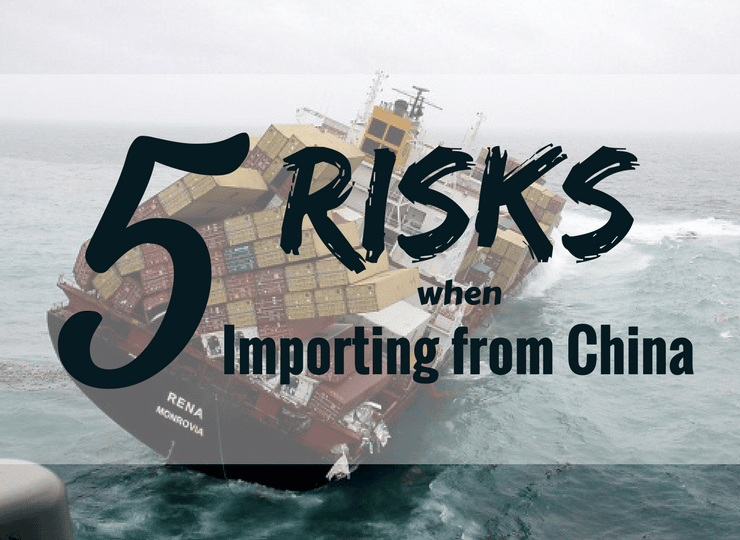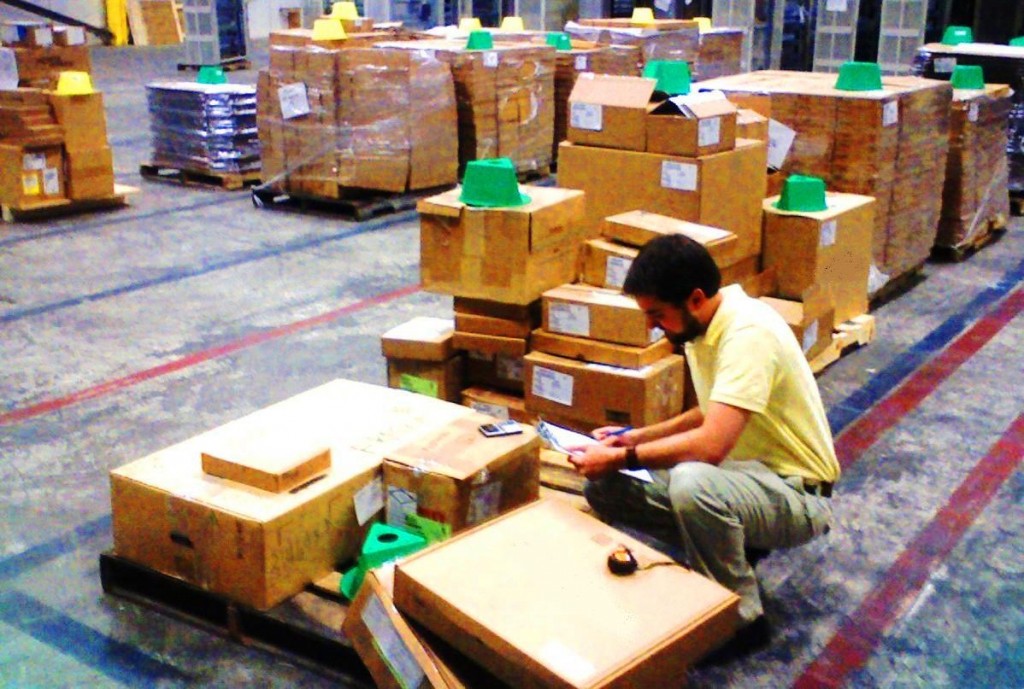Five Risks When Importing from China

Many new importers only consider the risk of a potential Supplier taking their money and never shipping their products as the biggest (and/or only) risk they can face. In reality, the likelihood of this happening is nearly negligible with even basic preperation.
There are, however, a number of risks you'll be susceptible to when importing from China that often importers fail to consider.
Your Shipment Gets Lost/Damaged in Transit
Whenever you have anything shipped, be it domestic or international, by sea or by road, there's a chance of things getting lost and/or damaged. You can, and should, purchase insurance to cover you in such events, but many importers do not, either as a calculated gamble or because they are unaware their shipment is not insured (know your incoterms!)
One of my first experiences importing was when I imported a small shipment of 100 ladders via LCL freight. I arranged to have a friend with a truck pick up these ladders for me from the Freight Forwarders warehouse where these were being picked up. When he delivered them, I was dismayed to find he had picked up 200 sets of German industrial brake pads instead. I never quite determined what happened (in hindsight my suspicion is the error took place at a warehouse in China, not Canada) and thankfully I was able to get our Supplier to resend replacement ladders after we placed another larger order. The moral of the story is that problems do happen in shipping.
Side note, I still have 200 sets of German industrial brake pads if anyone is looking :)
You Receive Poor Quality Products
You will, at some point, receive products of a lesser quality than you expect. If you are fortunate, these quality issues will be small and your products will still be sellable.
This fact must be a calculated cost of doing business for yourself. Product defects happen in all product manufacturing. However, you can affect your low quality/product defect rate.

You can have every single shipment inspected, and it will cost you $300-$1000+ and more importantly, it will cost you time. You will reduce (but not eliminate) product defects and low quality products to a very small number. Realistically, most importers do not have every single shipment inspected before shipment. And if you're importing a $2000 shipment, paying several hundred dollars in inspection fees is likely a bad return on your money.
The key is to avoid the possibility of receiving a large quantity of product that is unsellable and in which you have little recourse against your Supplier (recourse meaning they will out of goodwill replace or repair the product). You either do this by building trust with your Supplier over time and/or having large orders inspected before shipment.
Your Product Causes Personal Harm/Property Damage
Whenever you import a product, you are choosing to own any responsibility in regards to harm or damage the product may cause. This is why there is normally a strong favoritism by importers towards low risk products like furniture and clothing.
This is a broad topic and I won't go into detail here (see You, the Importer, Are Responsible for some more information).
The likelihood of any of the above happening is fortunately very small. However, if something does happen, it tends to happen in a very litigious way.
Liability insurance, which is very pricey and will deter most small importers, helps guard against such risks. This is a reactionary measure and ultimately you should be engaging in precautionary measures that avoid any harm and damage from occurring in the first place.
You Can't Sell Your Product Due to Import Restrictions/IP/etc.
You may end up with a product that you cannot legally sell in your country.
You may import a product that customs officials refuse to allow entry of. This could be because you import a product without proper safety certifications, insufficient labeling, etc.
You could also import a product that is protected by a patent, trademark, or other intellectual property rights. In the case of patents, you could be importing a knowingly patented product and simply ‘trying your luck'. Or, you may be importing a product that either you and/or your supplier does not know is patented. See the email below from one of my Suppliers who had a company contact them regarding possible patent infringement and was seeking my opinion.

Avoiding cases of unsellable products can be accomplished by doing a brief scan of your country's safety requirements and viewing comparable products on the market place to see if they advertise holding patents/trademarks.
You Can't Sell Your Product (for a profit) Due to Competitive Market Reasons
This is arguably the biggest risk you'll face when importing products from China. You import 200 computer desks for $50/each and plan to sell them on Amazon for $99 each. Once listed, you don't get a single sale for a month. You lower your price to $89, then $79, and then $69. Finally you get a sale. However, the desk costs you $25 to ship so you're actually losing $5.
It happens. Not every product you import will be a home run. The key to avoid these situations is incremental ordering. Order 10 desks, then 20 and then 200. By the time you get to 200 desks, your only doubt should be how long it will take you to sell 200 computer desks, not if you can sell them.
Your Supplier Takes Your Money and Runs
This is the one risk most new importers consider the most when importing from China. The reality is that the risk of your supplier taking your money and never shipping your products is highly unlikely. This is tantamount to fraud and China does have a fairly reliable legal system in place that deters most would-be fraudsters from doing such a thing. This isn't to say that this risk is completely irrelevant, but its likelihood is so low and can be guarded against so easily that you're far better to turn your attention to other risks.




This is my only concern, is if I pay the deposit will I ever see the goods.
Are there agents who take the payments and pay the supplier direct
Therefore if no goods I then get my money back from the agent.
Hi Tony,
There’s a ton of agents out who will happily serve as a middle man for you and it will eliminate almost entirely your chance of not receiving any goods. Suppliers taking your money in China is extremely rare. You’re far more likely to have a Supplier simply send you low quality goods.
If you’re concerned about fraud, I would also consider employing a third party inspection agency like qualityinspection.org. They’ll be happy to verify a factory and/or your shipment before you pay all of your money.